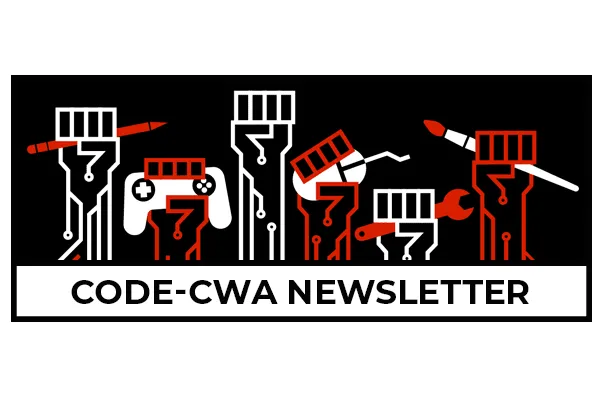CODE-CWA Newsletter: August 7

This was an exciting week.
Yesterday, news broke that the Voltage Entertainment writers won the first-ever successful game worker strike in the industry's history. Writers on the Lovestruck interactive romance novel game have been on strike for three weeks demanding higher pay.
CODE-CWA has been working with Voltage Entertainment writers on this campaign for some time, and we’re beyond excited to see a team of made up entirely women, non-binary, and/or LGBTQIA folks win fair pay. Read through the newsletter for more details.
Inspired to organize a union in your company? Get in touch, and let’s build together!
EventsCODE-CWA is still holding free, virtual training sessions about how to get started with organizing! Registration information is online here.
Worker NewsFreelance writers on the popular choose-your-romance video game won a huge pay increase from their employer, Voltage Entertainment, after a 21-day strike. Before the strike, writers were making an average of just 3.5 cents per written, far below the industry standard. The newly negotiated contracts pay an average of 6.5 cents per word. All writers received at least a 66% raise. This will result in hundreds of thousands of additional annual income across the team. We are so proud to have worked on this campaign. Not only will these raises make a big difference in the lives of the Voltage writers, but we hope it could usher in further wins for workers in the gaming industry, which has historically been very anti-union. More at vice.com.
Last Monday, thousands of childcare workers voted to join Child Care Providers United in the largest union election the country has seen in 20 years. Over 45,000 childcare workers voted in the election, and an astounding 97% of them voted in support of the union. This vote is the product of seventeen years of advocacy by childcare workers in California. In the past, California barred childcare workers from organizing, despite nearby states Washington and Oregon offering the workers more protections. The movement has been led by women of color — in California, childcare providers are overwhelmingly female and 74% non-white. More at talkpoverty.org.
A caravan of Amazon workers successfully disrupted work at a Bay Area Amazon Distribution Center on Saturday by blocking delivery trucks from leaving for several hours. The workers are demanding $30 an hour, health benefits, and increased protections from COVID-19. The Silicon Valley-based organizers say they were inspired to strike by their fellow Amazon warehouse workers in New York City, Chicago, and Minneapolis who all successfully held walkouts in the past two months. The successful blockade was a huge accomplishment, as it’s the first time Amazon workers have shut down an Amazon facility in the Bay Area. More at vice.com.
The National Labor Relations Board, made up entirely of three Trump-appointees, has ruled in favor of General Motors in a case brought forward by a Black employee who says he was fired for speaking up about discriminatory behavior. Labor law forbids bosses from firing employees for discussing or participating in labor organizing. But civil rights law requires bosses to prevent hostile work environments. In order to prevent hostile workplace environments, bosses often fire workers who use derogatory language. Previously, the NLRB had ruled that a worker using derogatory language to their boss while engaging in labor organizing was protected under labor law. The new NLRB ruling reverses that precedent. Worker organizers are concerned that bosses with leverage this increased power to shut down labor organizing. More at benefitnews.com.
Chaos struck the progressive political community this month when Akshai Singh, a queer worker of color who had been involved in internal labor organizing, was fired from the climate-justice nonprofit Sunrise Movement. Sunrise Movement leadership has stated publicly that they’re supportive of an employee union, but Singh argues they sang a different tune behind closed doors. Many onlookers supported Singh, but others were vehemently defensive of the progressive nonprofit. Regardless of what’s going in within the Sunrise Movement, one thing is true — many nonprofit bosses are guilty of union-busting. In this piece, Kim Kelly breaks down the myth of the “progressive boss” and investigates the prevalence of union-busting within so-called progressive organizations. More at thebaffler.com.
Epic Systems, a Madison, Wisconsin tech company with roughly 10,000 employees, is ordering workers back into the office starting Monday, August 10. Workers are rightfully concerned about their safety. COVID-19 cases are increasing in Wisconsin, and under the proposed return-to-work plan workers would be ordered back into the office at the same time that thousands of college students will move into the University of Madison. In response, workers are getting organized. Organizers have passed around a survey internally to show collective disapproval of the return-to-work timeline. Successful organizing in response to this pandemic would be a huge win against a notoriously anti-labor employer. More at tonemadison.com.
Organizing Tip of the MonthIt’s normal to get intimidated by the idea of talking to your coworkers about unionizing. Will they be scared away by the word union? Will they think your efforts are too radical?
Take it from the Voltage workers — don’t worry about the language! Start your organizing by talking to your coworkers about the concrete changes they want to see in your workplace. Make progress towards your collective goals, and people will join in time.
It’s actions, not words, that will build your union.
Today in Labor HistoryOn August 7, 1919, the Actors’ Equity Association (“Equity”) went on strike to demand higher wages, better working conditions, and a seat at the table in the theater industry.
At the end of the nineteenth century, management of several major theaters in New York consolidated into a single company, the Theatrical Syndicate. All of a sudden, the rules of big business applied to the theater industry. Actors’ wages were slashed without their input and they were subjected to increasingly bad working conditions. One of the actors’ most egregious grievances was that their rehearsal time was both unlimited and uncompensated. They could go for weeks or even months without getting paid for their work.
By 1913, actors were fed up, and they voted to unionize. They formed the first theater union in the nation, Equity. But after six years, management still refused to acknowledge or negotiate with the union.
Workers had had enough. On August 7, 1919, the members of Equity unanimously voted to strike. They instantly shut down twelve New York theaters. Management lost $25,000 in ticket sales from the first night alone.
Being actors, Equity had an inherent leg up on rallying public support. In the days following the walkout, actors held parades and performed benefit shows throughout the city. These attracted the attention of the public and the American Federation of Labor and helped the strikers earn broad support.
Due to overwhelming public support for the strikers, management acquiesced to many of Equity’s demands in time to end the strike on September 6, 1919. Management agreed to pay employees for rehearsal time, pay them overtime, and pay for costume and travel costs. They also established a consistent payday, which actors did not have before.
This victory was monumental. In total, the strike closed down 37 separate productions and resulted in a loss of over $2 million to the theater industry. The strike also challenged the public’s perception of a “worker.” Unions weren’t only for blue-collar laborers — artists are workers too!
Finally, the strike made national headlines, which led to a sharp increase in Equity’s membership. By the end of the strike, Equity’s membership had grown approximately 600%, and their bank account swelled from $13,500 to $120,000.
Equity remains a powerful union in the theater industry to this day. They currently represent both actors and stage managers.
Learn more on Wikipedia.
Actors’ Equity president marches in the 1919 strike (Wikimedia Foundation)
Song of the WeekThe Clash — "Career Opportunities"
(Don't feel like reading anymore? Click the song title to listen instead.)
They offered me the office, offered me the shop
They said I'd better take anything they'd got
Do you wanna make tea at the BBC?
Do you wanna be, do you really wanna be a cop?
Career opportunities, the ones that never knock
Every job they offer you is to keep you out the dock
Career opportunities, the ones that never knock
I hate the army and I hate the RAF
I don't wanna go fighting in the tropical heat
I hate the civil service rules
I won't open letter bombs for you
Career opportunities, the ones that never knock
Every job they offer you is to keep you out the dock
Career opportunities, the ones that never knock
Oi!
Bus driver
Ambulance man
Ticket inspector, I don't understand
They're gonna have to introduce conscription
They're gonna have to take away my prescription
If they wanna get me making toys
If they wanna get me, well I got no choice
Career opportunities, the ones that never knock
Every job they offer you is to keep you out the dock
Career opportunities, the ones that never knock
Career, career
Career, it ain't never gonna knock
CODE-CWA Newsletter: February 21, 2025

